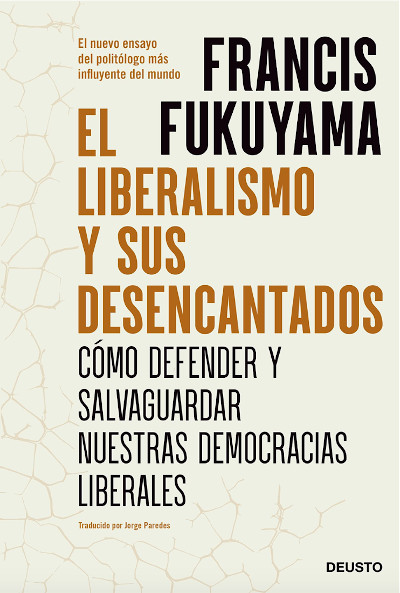In the picture
Cover of Francis Fukuyama's book 'Liberalism and its Disenchanted. How to defend and safeguard our liberal democracies' (Barcelona: Deusto, 2022) 176 pages.
In his most recent book, the American political scientist Francis Fukuyama once again deals with liberal democracy, which thirty years ago he proclaimed the undisputed triumph of and which today must worry about its survival. It is precisely the success of democracy that in recent decades has meant that leaders with purpose authoritarianism have had to accept democratic forms, but their government, in reality not very liberal, has ended up provoking social discontent that, mistakenly, is directed against a system of political values that were rather being violated. Thus, Fukuyama warns that although Trump, Bolsonaro and Erdogan, among others, have invoked the name of liberalism from power, their actions should be qualified otherwise.
The ten chapters of 'Liberalism and its Disenchanted' begin with a definition of the terms proper to the liberal current, differentiating them from the interpretations made by some political leaders who present themselves as if they were moved by this political and economic inspiration.
The realization of these misunderstandings about liberalism and its misuse, distances this work from the special optimism that Fukuyama showed in 'The End of History and the Last Man', an emblematic book of 1992, written at the end of the Cold War. Nevertheless, the author adopts a positive and hopeful tone: he thinks that the disenchantment that surveys reveal in relation to democracy in many Western countries is due, together with the authoritarianism and corruption embodied by politicians and leaders, to some failures in the application of the system. Having detected the problems, depending on how you look at it, constitutes progress, because this is the way to try to solve them.
Perhaps the most frustrating element in many societies is the gap between the goodness that the capitalist system preaches - it assures that the free market will lubricate everything and generate 'per se' economic growth - and the unequal distribution of wealth. While there are voices that point to this disparity to attack the connection or dependence between political liberalism and economic capitalism, Fukuyama insists that both parameters go in parallel: their joint application has brought about positive and constant changes throughout history. The recognition, defense and generalization of human rights and the economic progress of very broad social strata in a multitude of countries attest to the benefits of the institutionalization of liberalism, in both its political and economic aspects.
Nevertheless, capitalism has had some excesses that should be corrected, just as today the democratic spirit leads to a greater appreciation of diversity than in the past, which calls for some practical adjustments. It is here that Fukuyama proposes what he calls a "humane" liberalism, that is, a liberalism that can balance the economic dimension with the social dimension, aspects that have sometimes been seen as contradictory but are not.
Throughout the book, Fukuyama seems to be caught between the incongruities that sometimes arise in certain situations of democracy and liberalism in general. Although he tries to explain what this "human" liberalism would be -which should not be confused with what would properly be a "third way" nor does it pretend to emulate, symmetrically, what came to be called "socialism with a human face"- in the end the new contours that liberal democracy should adopt in order to survive in a changing world and not disappoint the majority of citizens are left vague.

